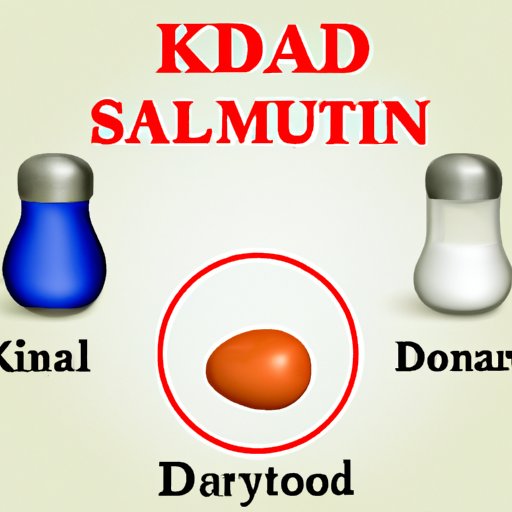How Much Sodium is Allowed on a Renal Diet?
Kidney health is essential to overall well-being, as this vital organ helps filter waste and regulate fluids in the body. One of the key factors in maintaining kidney health is managing sodium intake. While sodium is an essential mineral that helps regulate blood pressure and fluid balance, excess intake can negatively impact kidney function. For those following a renal diet, understanding the appropriate amount of sodium to consume is essential. In this article, we’ll explore the role of sodium in a renal diet, discuss recommended intake levels, and offer tips for reducing sodium intake while still enjoying delicious, nutritious food.
Sodium and Kidney Health: Understanding the Renal Diet
A renal diet is a diet designed to help individuals with kidney disease or compromised kidney function manage their health. The primary goal of a renal diet is to reduce the buildup of waste and fluid in the body, which can lead to serious health complications if left unchecked. Sodium plays a central role in a renal diet, as it can contribute to fluid retention and high blood pressure, both of which can negatively impact kidney function. By limiting sodium intake, individuals on a renal diet can better manage their kidney health and prevent further complications.
The Importance of Limiting Sodium on a Renal Diet
Limiting sodium intake can have a range of positive effects on kidney health. High sodium intake has been linked to an increased risk of kidney disease, while reducing sodium intake has been shown to improve kidney function in those with existing kidney issues. Furthermore, high sodium intake can contribute to high blood pressure, which can increase the risk of heart disease and stroke. Overall, limiting sodium on a renal diet is essential to protecting kidney function and supporting overall health.
Renal Diet and Sodium: What You Need to Know
The recommended daily sodium intake for individuals on a renal diet can vary based on a range of factors, including age, sex, weight, and overall health. Generally, those on a renal diet should aim for a sodium intake of 1,500 to 2,300 milligrams per day, depending on their individual needs. Common sources of sodium in the American diet include processed foods, canned goods, snack foods, and fast food. Those on a renal diet should monitor their intake of these types of foods and opt for fresh, whole foods whenever possible.
How Much Sodium is Too Much for Kidney Health? A Look at the Renal Diet
Excess sodium intake can have a range of negative effects on kidney health. In the short term, high sodium intake can lead to fluid retention, swelling, and dehydration. In the long term, high sodium intake can contribute to high blood pressure, kidney disease, and kidney failure. Signs of excess sodium intake to watch out for include frequent thirst, swelling in the hands and feet, and high blood pressure. To reduce sodium intake and protect kidney health, individuals on a renal diet should aim to eat fresh, whole foods and avoid processed and packaged foods whenever possible.
Mastering the Renal Diet: Tips for Reducing Sodium Intake
Reducing sodium intake on a renal diet doesn’t have to be difficult or boring. In fact, there are many delicious, low-sodium options available that can help individuals on a renal diet stay healthy and satisfied. Some tips for reducing sodium intake include using fresh herbs and spices to flavor food, choosing low-sodium or sodium-free canned goods, and opting for fresh fruits and vegetables instead of packaged snacks. For those dining out, it’s important to research menu options in advance and ask for low-sodium substitutes whenever possible.
Conclusion
Managing sodium intake is essential to protecting kidney health and overall well-being. By following a renal diet and monitoring sodium intake, individuals with compromised kidney function can improve their quality of life and avoid serious complications. If you or a loved one are on a renal diet, be sure to consult with a qualified healthcare provider and seek out support and resources as needed. With the right mindset and practical tips, it’s possible to enjoy a healthy, low-sodium diet that supports kidney health and overall wellness.
(Note: Is this article not meeting your expectations? Do you have knowledge or insights to share? Unlock new opportunities and expand your reach by joining our authors team. Click Registration to join us and share your expertise with our readers.)
